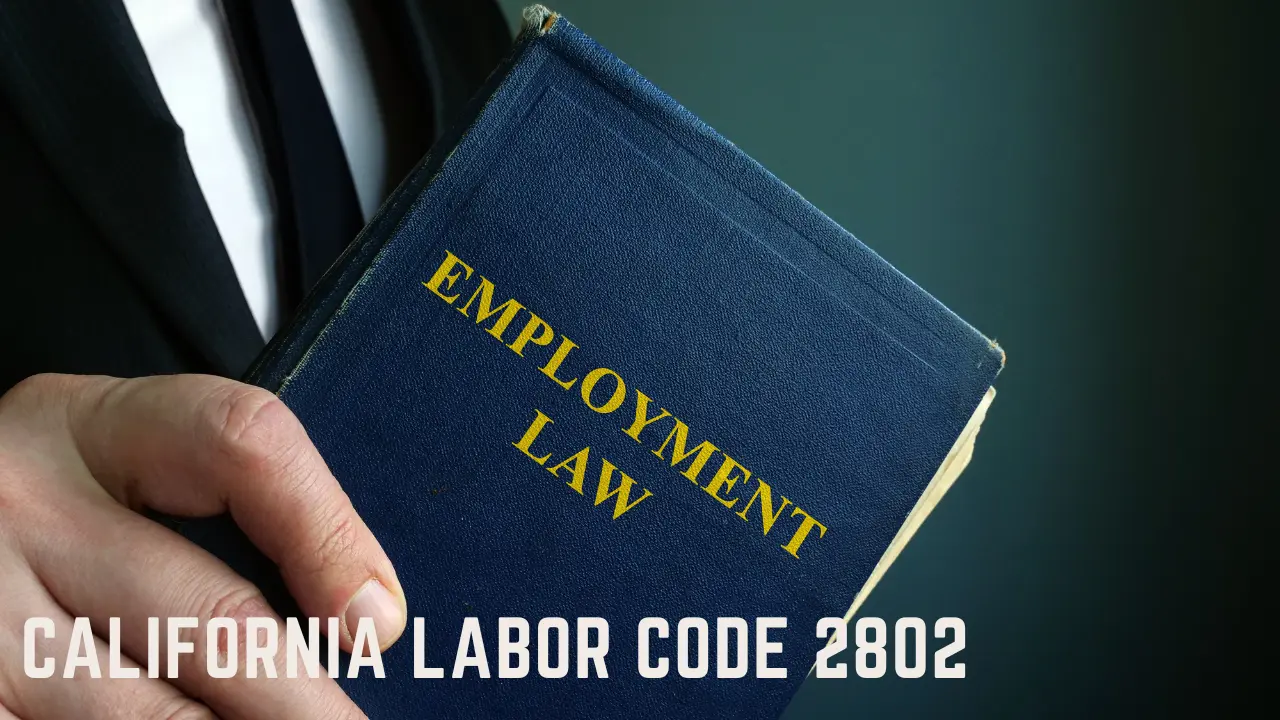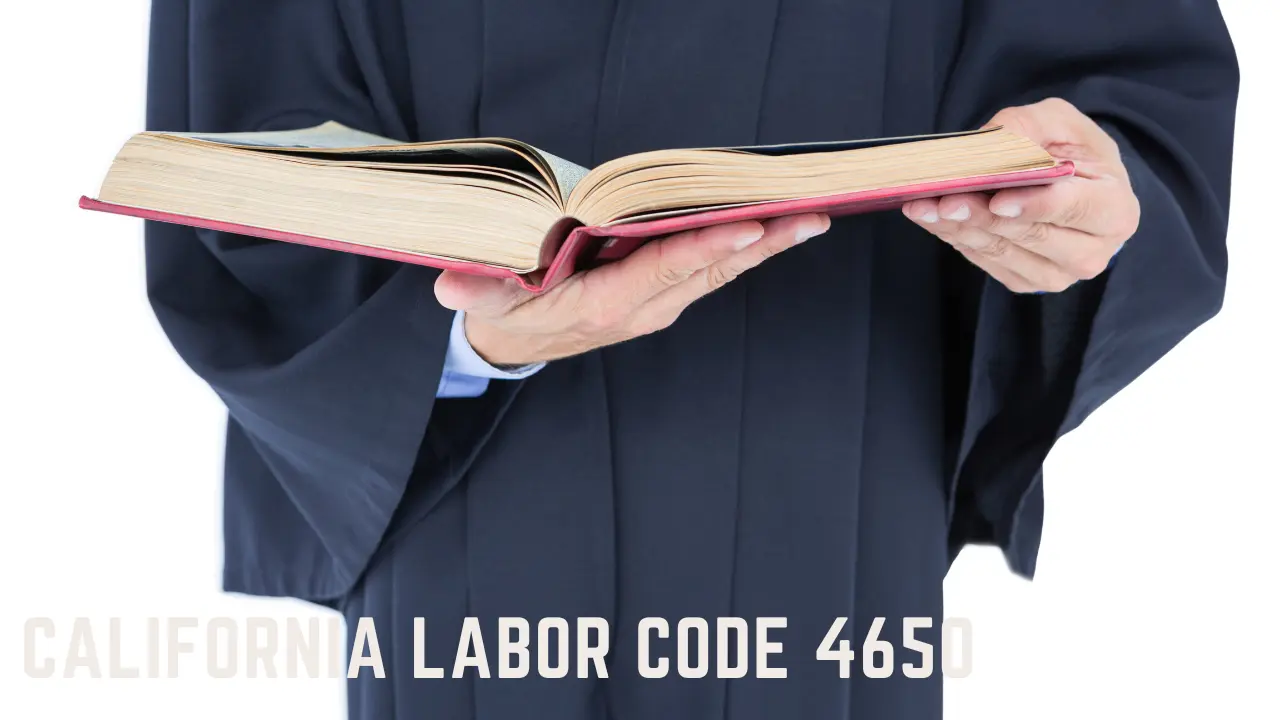Table of Contents
ToggleThe scope of this code is expansive, encompassing all work-related costs from travel expenses to office supplies, and even extending to the realm of remote work. While the law offers substantial protection to employees, determining what exactly qualifies for reimbursement can often be a complex process, contingent on job-specific details and the employer’s policies.
Furthermore, the tax implications of such reimbursements add another layer to this multifaceted issue. Let’s embark on a comprehensive exploration of Labor Code 2802, its key elements, and its implications for all parties involved.
Understanding Labor Code 2802
A comprehensive understanding of Labor Code 2802 is crucial as it serves as a protective legal provision, ensuring that employees in California are rightfully reimbursed for any job-related expenses they have incurred.
The code underscores that employers are obligated to cover expenses necessary for employees to perform their duties. This includes a wide range of potential expenditures, from travel costs to purchases of uniforms or equipment.
Importantly, California Labor Code 2802 explicitly states that employees cannot waive their right to reimbursement. In essence, it provides a legal safety net, protecting employees from bearing the financial burden of work-related costs.
Violations of the code may result in wrongful termination claims if an employee is dismissed for requesting reimbursement.
Eligibility and Requirements for Reimbursements
Building on the foundational understanding of Labor Code 2802, it is essential to clarify the specific eligibility criteria and requirements that dictate when and how employees can seek reimbursements for work-related expenses.
- First, the expenses incurred must be necessary for the performance of the job and directly related to the tasks at hand. Unnecessary or personal expenses are not eligible for reimbursement.
- Second, the employee must provide the employer with reasonable documentation or proof of the expense. This can be receipts, invoices, or detailed logs.
- Third, employees must submit the reimbursement request within a reasonable time frame, as dictated by the company’s policy.
- Lastly, if the employer provides an advance or an allowance for expenses, the employee must account for these funds properly. Misuse or failure to account could result in denial of reimbursement.
Reimbursements in Remote Work Context
In the context of remote work, which has surged in prevalence due to the COVID-19 pandemic, the applicability of Labor Code 2802 to reimbursements has expanded to cover a wider range of work-related expenses. As employees set up their home offices, the costs associated with hardware, software, internet connectivity, and other utilities become necessary business expenses. Employers are therefore obligated to reimburse these costs under Labor Code 2802.
Additionally, items such as office furniture and printing supplies that are required for the performance of work duties are also reimbursable. This expansion emphasizes the principle of Labor Code 2802 that employees should not bear the costs associated with performing their jobs, regardless of their work location.
Tax Considerations for Reimbursements
While the necessity of reimbursing remote workers for their expenses has become increasingly clear, it’s also important to understand the tax implications that come with such reimbursements.
- First and foremost, reimbursements for work-related expenses are generally non-taxable to the employee. However, they must be accounted for properly under an accountable plan, which requires employees to substantiate their expenses.
- If these conditions are not met, the reimbursement could be deemed as taxable income to the employee.
- Employers can also deduct these reimbursements as business expenses. However, this is subject to restrictions and documentation requirements.
- On the other hand, salary increases given in lieu of reimbursements are fully taxable to the employee and are subject to payroll taxes for the employer. Care must be taken to avoid inadvertent tax liabilities.
Salary Increases Vs Direct Reimbursements
Navigating the complexities of salary increases versus direct reimbursements is a critical task for employers aiming to comply with California Labor Code 2802 and maintain fair compensation practices.
Salary increases may seem like an easier solution; however, they may lead to enforcement difficulties if not explicitly stated as reimbursement compensation.
Direct reimbursements, on the other hand, are clear, traceable, and can be tax-deductible if certain conditions are met. However, they demand rigorous record-keeping and management.
An efficient system for tracking and approving expenses is necessary to ensure compliance with these regulations. Employers must weigh these considerations and choose the most equitable and manageable approach, factoring in their operational capacities and the specific needs of their workforce.
Special Rules for Hospital Workers
Shifting our focus to the healthcare sector, specific reimbursement regulations have been established for hospital workers under the California Labor Code 2802. Starting in 2021, significant changes were introduced in terms of expense reimbursements for these healthcare professionals.
- Hospital workers are now entitled to reimbursement for costs incurred during workplace training. This covers a broad range of programs including residencies, orientations, and competency validations.
- The law is specifically applicable to general acute care hospitals. These include short-term hospitals providing high-level medical care in critical conditions.
- The law is intended for employees who are providing direct patient care. This includes doctors, nurses, and other medical staff directly involved in patient treatment.
- The law also applies to job applicants preparing for roles that involve direct patient care.
Common Misconceptions About Labor Code 2802
In the realm of employment law, several misconceptions persist surrounding the application and interpretation of Labor Code 2802, which can potentially lead to confusion and noncompliance. A common misunderstanding is that employers can unilaterally decide what constitutes a necessary expense. However, the law looks at whether the expenditure is directly related to the job, not the employer’s subjective judgment.
Another fallacy is assuming all expenses are reimbursable. In reality, only reasonable costs, directly related to the job, qualify.
Lastly, many falsely believe that federal employees are covered under this law. It is paramount to understand that the Labor Code 2802 applies specifically to California, and federal laws vary considerably.
Conclusion
In conclusion, California Labor Code 2802 is a crucial legislation safeguarding employees’ rights to work-related expense reimbursements. It is imperative for both employees and employers to comprehend its provisions, notably in the context of remote work and tax considerations.
Special attention should be paid by hospital workers, given their additional rights under this law. Misunderstandings or misapplications can lead to legal disputes, underscoring the importance of thorough knowledge and compliance with this labor code.
















